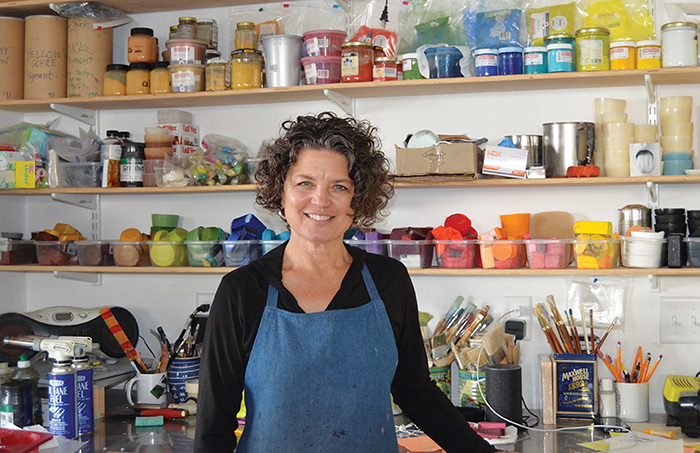The Artist Toolbox
The CMCA’s Educational Initiative

From the dawn of time, the job of artists has been to employ material to communicate truths and capture the world as they see it. For many millennia, that was enough. Today’s artists, however, must also be equipped with the skills and know-how to document, present, and promote their work on multiple platforms such as Instagram, LinkedIn, online galleries, and personal websites. Gallerists interested in recruiting new artists and jurors doing research on applicants often look to these sources. A poorly lit image or clunky presentation can have an outsized impact.
Artists who have earned their MFA within the past 10 or 15 years often learn these skills as part of the curricula, and solidly established artists may be in a position to hire others to do this for them, but there remains a large number of working artists who struggle with how to best present their work. Well-lit, professional-quality images are possible on a cell phone, but only if the user understands how to adjust the settings, frame the image, and properly crop and adjust the final product. “These are key tools,” says Suzette McAvoy, executive director of the Center for Maine Contemporary Art (CMCA). “It impacts their ability to respond to opportunities.”
With years of experience in working directly with artists, as well as fielding entries for their biennial, CMCA is not lacking in evidence on where artists need guidance and instruction. “We see so many submissions with images that are the wrong size, incorrectly labeled—or just poorly taken,” says McAvoy. “The artists might be doing great work in their studio, but it never gets past the initial review because of this.” Rather than simply bemoan the state of affairs, CMCA has made the bold decision to directly address the need. Working in partnership with Maine artist and instructor Kim Bernard, and supported by a grant from the Roxanne Quimby Foundation, this year will see the launch of the educational initiative, the Artist Toolbox.
Starting in February, Bernard is traversing the state of Maine giving hour-long Artist Toolbox Talks, on issues such as how to properly document work, creating an attractive and useful website, how to gain gallery representation, pricing your work, networking, and other small business basics. These informational sessions, followed by time for Q & A sessions, are free and open to the public.
The talks are designed to provide a solid entry into the basics of professional presentation. Those who wish to dig deeper and gain more intensive hands-on experience with the work of building a professional profile and practice may choose to sign up for the intensive programs. These weekend-long workshops offer “a deep dive” into image documentation, creating a professional resumé, as well as crafting an artist’s statement, building a professional website, harnessing social media, writing grants, establishing relationships with gallerists, finding residencies, and managing the business end of being an independent artist. Due to the intensive nature of these workshops, registration is required (cmcanow.org) and class size is limited to 12. The registration fee is $100 for the general public, and free to CMCA members.
Bernard, a well-known Maine artist, has been leading workshops and offering individual mentorship in business for artists for years, a practice borne out of her own experience. “When I was in art school,” says Bernard, “it was taboo to talk about selling art. That’s not true anymore. I had to learn the hard way, but I also learned what artists need to know.” With her years of personal experience as a working artist and professional instructor, she was the obvious choice to lead the workshops.
CMCA is embracing this first year as a living experiment. “We hope to learn a lot about what works, and what we need to shift,” says McAvoy. “Depending on the reaction, we’ll see what happens next. Do we add more sessions? Put the content online? Create short how-to videos? This is some of what we hope to learn, and we also hope that this will serve as a template for other states where artists have similar needs.”
In a world that is increasingly fast-paced, image-saturated, and reliant upon web-based presence, Maine can be grateful for a humanscaled approach to decoding the details today’s artists require to make their work known and their studio practice functional.
Heather Martin is a writer and educator who lives on the coast of Maine with her artist partner, two children, two horses, and many dogs. She has her master’s in Museum Studies from Harvard.
